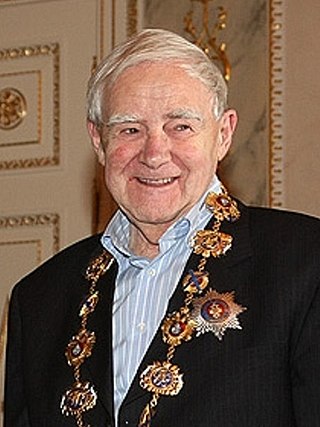Top Qs
Timeline
Chat
Perspective
Daniil Granin
From Wikipedia, the free encyclopedia
Remove ads
Daniil Aleksandrovich Granin (Russian: Дании́л Алекса́ндрович Гра́нин; 1 January 1919[b] – 4 July 2017), original family name German (Russian: Ге́рман),[2] was a Soviet and Russian author.
Remove ads
Life and career
Granin started writing in the 1930s, while he was still an engineering student at the Leningrad Polytechnical Institute. After graduation, Granin began working as a senior engineer at an energy laboratory, and shortly after war broke out, he volunteered to fight as a soldier.[3]
One of the first widely praised works by Granin was a short story about graduate students titled "Variant vtoroi" (The second variant), which was published in the journal Zvezda in 1949. Granin had continued to study engineering and work as a technical writer before he achieved literary success, thanks to his Iskateli (The Seekers, 1955), a novel inspired by his career in engineering. This book was about the overly bureaucratic Soviet system, which tended to stifle new ideas.[3] Granin served as a board member of the Leningrad Union of Writers, and won many medals and honors including the State Prize for Literature in 1978 and Hero of Socialist Labor 1989.[4] He continued writing in the post-Soviet era.[3]
Remove ads
Writing
According to the Great Soviet Encyclopedia: "The main theme of Granin’s works is the romance and poetry of scientific and technological creativity and the struggle between searching, principled, genuine scientists imbued with the communist ideological context and untalented people, careerists, and bureaucrats (the novels Those Who Seek, 1954, and Into the Storm, 1962)".
In 1979, he published Blokadnaya kniga (translated as A Book of the Blockade), which mainly revolves around the lives of two small children, a 16-year-old boy and an academic during the Siege of Leningrad.[5] Written together with Ales Adamovich, the book is based on the interviews, diaries and personal memoirs of those, who survived the siege during 1941–44.[6] It was nominated for the 2004 Lettre Ulysses Award for the Art of Reportage.[7] On September 8, 2021, the film "The Blockade Diary," based on Granin's "A Book of the Blockade," was presented in Moscow cinemas.[8]
One of his most popular books is The Bison (1987), which tells the story of the Soviet geneticist Nikolay Timofeev-Ressovsky.[5] In October 1993, he signed the Letter of Forty-Two.[9]
Remove ads
Honours and awards

- Hero of Socialist Labour (1989)[10]
- Order of St. Andrew (28 December 2008) – for outstanding contribution to the development of national literature, many years of creative and social activities[11]
- Order of Lenin[12]
- Order of the Red Banner of Labour[12]
- Order of the Red Star[12]
- Order of Friendship of Peoples[12]
- State Prize of the Russian Federation (12 June 2017)
Works
Below is a list of works by Granin translated into English:
Notes
- In his early autobiographies Granin wrote that he was born on 1 January 1918 in the "town of Volyn, Kursk Governorate." The town with such name never existed, most probably he meant the selo of Volynka in what is now Rylsky District.
- Year of birth mistakenly given in some sources as 1918 because of a misprint in a 1964 literary encyclopedia.[1]
References
External links
Wikiwand - on
Seamless Wikipedia browsing. On steroids.
Remove ads

